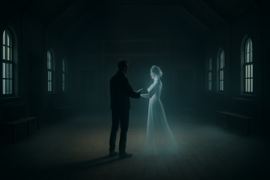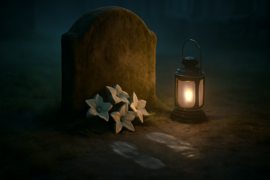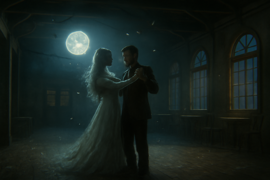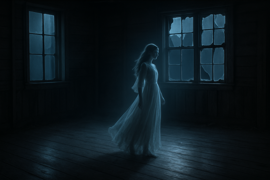Introduction
Michael Moreau never expected to dance under moonlight on an empty wooden floor. Yet when a faded billboard at the edge of Hurston, Ohio, spoke of “Live Music Tonight,” he felt a curious pull. He parked his car beneath an ancient oak whose gnarled branches scraped the sky, then walked across cracked pavement littered with dead leaves. The hall’s battered neon sign flickered, “Club Evergreen,” sending tremors along the peeling brick. Inside, a single light bulb swayed, revealing dusty chairs stacked like silent sentinels. A battered piano sat in one corner, its keys yellowed and worn. An electric fan whirred softly, stirring motes in the stale air. Then, as he stepped onto the floor, he heard music—slow, lilting, impossibly clear. The melody was elegant, as if played here every night for a century. That’s when he saw her: a woman in a flowing gown that trailed like mist, her form barely solid beneath the pale glow. Her eyes met his, and she inclined her head. Without thinking, Michael extended his hand. She placed hers in his palm like warm porcelain. He felt the world tilt as he followed her into a waltz he could not resist. Each step resonated across floorboards long since abandoned. The air tasted of old roses and regret. He smelled lavender and cold earth. He felt a sorrow so deep that it rooted him to the spot, yet he could not let go. Her laughter was a sinewy echo that wrapped around his heart, beckoning him deeper into a memory not his own. As he twirled, the hall swelled with unseen witnesses—a gathering of silent shapes beyond the rim of candlelight. Michael’s breath came in shallow gasps, and he wondered how a place so dead could feel so vividly alive. This was more than a dance: it was an invitation to unlock a storied past bound forever to these walls.
The First Encounter
Michael’s heart thundered as he tried to place the music he’d heard. It reminded him of vinyl records spun at his grandparents’ house, a slow ballroom waltz he couldn’t name. He searched the inky darkness, expecting an old phonograph or a jukebox hidden behind tattered drapes. But no source lay inside that cavernous space—only candles flickering in tarnished holders, their flames steady in the gentle draft. With every note, the floor beneath his shoes vibrated as though alive. He whispered, “Who’s there?” and the melody paused. The candles dimmed to embers. A soft voice replied, “I’ve waited so long.”

He turned and found her standing at the far end of the hall. Her gown was the color of moonlit snow, drifting around her ankles like a pale mist. She looked as real as any woman he’d ever known, save for the way her toes never disturbed the dust. She raised one slender hand to beckon him further across the boards. For reasons he could not articulate—danger, curiosity, longing—he obeyed. Their first steps were tentative, but as the music resumed, they synced with uncanny grace. He felt her palm against his, cool yet inviting, and as they circled, he glimpsed a tear glint on her cheek like a falling star.
Questions rushed through his mind: Was she a dancer who’d vanished in time? A spirit trapped by sorrow? But the moment he looked into her eyes, none of that mattered. She guided his hand to her waist, and he led her in turn. He felt stories unfolding in every turn—the echo of a song he didn’t know, the ache of a farewell unspoken. When the melody swelled, the walls themselves seemed to pulse with memory. Michael dared to ask, “Why do you dance alone?” The candles flickered and cast her shadow in a loop around them. “I will dance until someone remembers me,” she whispered.
Secrets in the Shadows
Determined to uncover her story, Michael spent the following days tracing local whispers. He pored over yellowed newspapers at the Hurston Public Library, scanning grainy photographs of Club Evergreen in its heyday. In one image, a young woman in a white satin dress spun beneath glittering chandeliers. A caption read: Mary Prescott, champion of the annual Autumn Ball, lost to tragedy in 1952. He found an obituary describing a fatal accident—her car skidding off a rain-slick road, her body claimed by the river. Everyone mourned her grace on the dance floor, they wrote, yet no one mentioned the ring she wore—a slender band engraved with the letter “M.”

Next, he visited the local historical society. An elderly volunteer led him to a glass case filled with tarnished trophies and brittle programs. She pointed at an award: “Best Dancing Duo.” Beneath it lay a folded letter delivered to Mary just days before her death, unsigned but confessing a love that would last forever. Michael felt a chill. If Mary’s spirit haunted these boards, it was not only for the thrill of the waltz. It was for that love letter, that promise left unfulfilled.
He drove to the cemetery at dusk, the sky a bruised purple horizon. He found her grave marked by a weatherworn headstone and a single lily placed by an unnamed mourner. At the base, the ground was stained with fresh dew and tiny footprints—like the imprint of a ghost who walks at night. Michael knelt, traced the engraving with trembling fingers, and whispered, “Mary Prescott, I remember you.” A breeze stirred the lilies, and he felt her presence as surely as any living breath. When he left, the lanterns along the pathway glowed brighter, as if in approval.
The Midnight Waltz
That night, Michael returned to Club Evergreen with resolve. He carried a lantern, a small bouquet of lilies, and the love letter he’d found. The hall appeared unchanged, timeless in its silence. He placed the flowers at the center of the floor and unfolded the letter. The words beneath his lantern’s glow trembled like a heartbeat: “Meet me at midnight beneath your favorite stars. I will hold you one last time.” He set aside the paper and waited. Moments later, the music began again—slow, heartbroken, achingly beautiful.

She emerged from the shadows, her gaze soft and hopeful. Michael cradled the letter against his chest. “Mary,” he said, voice thick. She held out a hand and came to him without a sound. As they resumed their waltz, petals from the lilies drifted around them like snow. He read the letter aloud in a low tone, each line resonating in the dust-choked air. She listened, tears glinting in her spectral eyes. He felt the burdens of decades lift from her shoulders the moment her name slipped from his lips.
Outside, the moon climbed higher, flooding the hall with silver light. The air grew still beyond the lantern’s glow, and every creak of the floor felt like applause. As the final line passed his lips—“Forever yours, M.”—Mary closed her eyes and pressed her forehead against his cheek. Michael held her steady in that timeless embrace. Then she smiled, a softening of sorrow, and began to fade. The petals swirled upward, carried on an unfelt breeze, and in the last notes of the waltz, she was gone. The music wound down to silence, leaving Michael alone with the echo of memory and a single lily petal at his feet.
Conclusion
Michael stood in the stillness long after the last candle guttered out. The bouquet of lilies lay untouched at center stage, their petals now dusted with floor grime. He closed his eyes and felt a surge of bittersweet relief—he had freed Mary from her endless dance and carried her story into the living world. As he turned to leave, a single beam of moonlight filtered through a broken window, illuminating the love letter and the faint outline of two footprints side by side. He knew the hall would never be the same; her presence had reshaped it, woven memory into every board and beam.
In the days that followed, locals tentatively ventured through the old doors, drawn by Michael’s retelling. They brought fresh flowers, swept the floors, and found themselves humming the waltz that had haunted those walls. The legend of Mary Prescott spread beyond Hurston, traveling in whispers and campfire tales to faraway towns. Tourists arrived at midnight, hoping for a glimpse of dancing shadows. But Michael carried the truest remembrance in his heart: a bittersweet understanding of love that endures beyond death, and the comfort that sometimes, a single dance can heal a soul. Each time he passed Club Evergreen, he’d glance through its cracks and smile, knowing that somewhere in the pale glow, Mary’s spirit finally dances free. He left behind no fear—only a renewed wonder at the power of memory, the endurance of devotion, and the way a single moment shared beneath moonlight can last through all eternity.



















